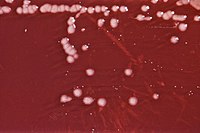
Photo from wikipedia
Plant growth-promoting bacteria (PGPB) are promising alternatives in the reduction of the use of chemical fertilizers. Likewise, humic acid (HA) can improve plant growth and/or the establishment of endophytic PGPB.… Click to show full abstract
Plant growth-promoting bacteria (PGPB) are promising alternatives in the reduction of the use of chemical fertilizers. Likewise, humic acid (HA) can improve plant growth and/or the establishment of endophytic PGPB. Although the effects of PGPB colonization or HA treatment have been studied separately, little information is available on plant response to the combined applications of PGPB and HA. Thus, the aim of this work was to understand the physiological effects, bacterial colonization and transcriptional responses activated by endophytic bacterial strains in tomato roots and shoots in the absence (control condition) and presence of HA (HA condition). Tomato shoot length was promoted by seed inoculation with Paraburkholderia phytofirmans PsJN, Pantoea agglomerans D7G, or Enterobacter sp. 32A in the presence of HA, indicating a possible complementation of PGPB and HA effects. Tomato colonization by endophytic bacterial strains was comparable in the control and HA condition. The main transcriptional regulations occurred in tomato roots and the majority of differentially expressed genes (DEGs) was upregulated by endophytic bacterial strains in the HA condition. Half of the DEGs was modulated by two or three strains as possible common reactions to endophytic bacterial strains, involving protein metabolism, transcription, transport, signal transduction, and defense. Moreover, strain-specific tomato responses included the upregulation of signal transduction, transcription, hormone metabolism, protein metabolism, secondary metabolism, and defense processes, highlighting specific traits of the endophyte-tomato interaction. The presence of HA enhanced the upregulation of genes related to signal transduction, hormone metabolism, transcription, protein metabolism, transport, defense, and growth-related processes in terms of number of involved genes and fold change values. This study provides detailed information on HA-dependent enhancement of growth-related processes stimulated by endophytic bacterial strains in tomato plants and reports the optimized dosages, complementation properties and gene markers for the further development of efficient PGPB- and HA-based biostimulants.
Journal Title: Frontiers in Plant Science
Year Published: 2020
Link to full text (if available)
Share on Social Media: Sign Up to like & get
recommendations!